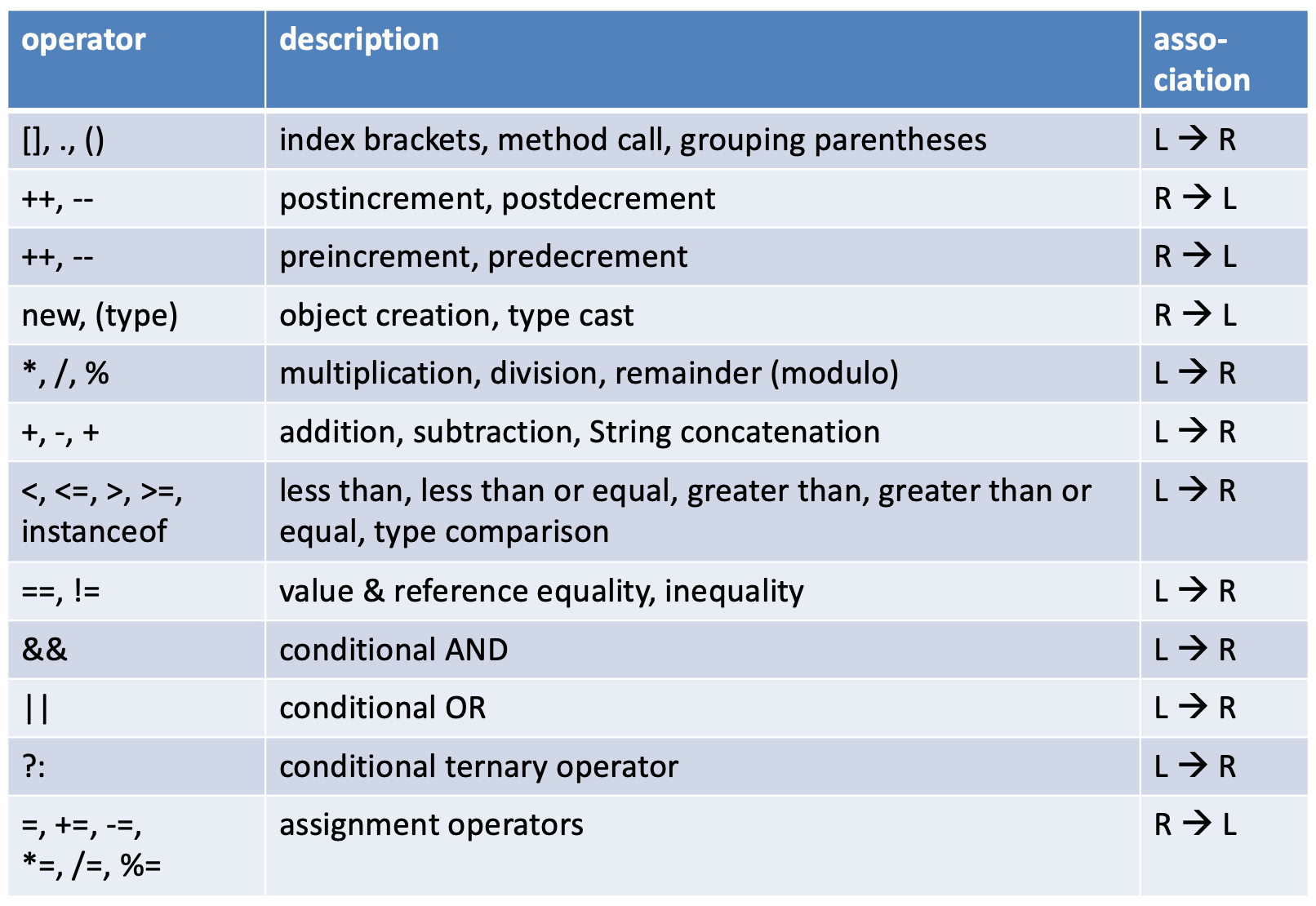7. Operators#
Operators are the syntax elements that bind, change and combine the data, classes and methods of your program.
Although they are extremely important, they are not very interesting in the sense that
they are just what they are, almost the same in any programming language.
Therefore, this post is quite small. It starts with an overview of all operators and ends with a more detailed description of the less obvious ones.
7.1. Overview#
Operators can be classified as assigning (e.g. = and -=), modifying, as in count++ and they can be comparing, as in count < maximum.
Another way to classify them is to look at the number of operands they work on. They
can have one (unary - count++;), two (binary - count < maximum) or
three (_ternary- - boolean old = (age > 65 ? true : false);) operands.
Operators can be ordered by their precedence, which is the priority (order) in which they will be evaluated.
int x = 41;
int count = 1;
int y = x + ++count;
System.out.println("count=" + count + "; y=" + y);
This snippet will output count=2; y=43 because the pre-increment operator has
precedence over +, and the assignment operator.
Here is the complete listing. The associativity (Left-to-Right or Right-to-Left) of an operator is a property that determines how operators of the same precedence are evaluated in the absence of parentheses.

Feel free to use parentheses
Use the rule always use parentheses when in doubt about precedence” as a general guideline. They always have the highest precedence, and improve readability a lot. Compare these with respect to readability:
x = y + z * 2 / Math.PI;
x = y + ((z * 2) / Math.PI);
7.2. The operators#
7.2.1. Assignment operators#
Not all languages have such an extended set of assignment operators.
When you want to change the value of a variable, you can use these shorthand assignment operators
x = x + 2;is the same asx += 2;
x = x + y;is the same asx += y;
x = x * 3;is the same asx *= 3;
x = x / 3;is the same asx /= 3;
x = x % 3;is the same asx %= 3;
The last three are a bit esoteric in my opinion and I do not use them because they
lower the readability of the code (especially %=).
7.2.2. Modulo: %#
The modulo operator is also called the remainder operator; it gives the remainder of a division.
10 % 3 returns 1 (one)
8 % 5 returns 3
This operator is often used when even/uneven items need to be identified, or other periodicity cases. This will address every hundredth item:
if (x % 100 == 0) {
/*deal with every hundredth item
}
7.2.3. Ternary operator#
The ternary operator is actually a condensed if..else block but can give more comprehensive code.
if (age < 18) {
minor = true;
}
else {
minor = false;
}
is the same as
minor = (age < 18 ? true : false);
It is often used for processing String tags, such as this one.
String academicTitle = employee.getTitle();
String name = employee.getName();
name += (academicTitle == null ? ", " + academicTitle : "");
7.2.4. instanceof#
The instanceof operator (keyword) is a boolean operator that will yield true of the left operand
is the type of the right operand, or a subtype of it. Defining inheritance (subtypes) is done using the extends keyword. Here is an example.
class Animal{}
class Wolf extends Animal{}
class Dog extends Animal{}
class Chihuahua extends Dog{}
Dog dog = new Dog();
Wolf wolf = new Wolf();
Chihuahua chihuahua = new Chihuahua();
System.out.println("dog instanceof Animal = " + (dog instanceof Animal));
System.out.println("dog instanceof Object = " + (dog instanceof Object));
//System.out.println("wolf instanceof Dog = " + (wolf instanceof Dog)); //does not compile
System.out.println("chihuahua instanceof Dog = " + (chihuahua instanceof Dog));
System.out.println("chihuahua instanceof Animal = " + (chihuahua instanceof Animal));
System.out.println("chihuahua instanceof Chihuahua = " + (chihuahua instanceof Chihuahua));
outputs
dog instanceof Animal = true dog instanceof Object = true chihuahua instanceof Dog = true chihuahua instanceof Animal = true chihuahua instanceof Chihuahua = true
